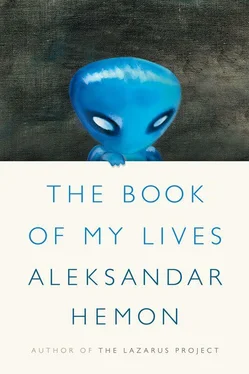The following week I was cordially invited over the phone to visit the State Security offices — a kind of invitation you cannot decline. They interrogated me for thirteen hours straight, in the course of which I discovered that all the other people who attended the party had visited or were going to visit the warm State Security offices. Let me not bore you with the details — let’s just say that the good cop, bad cop routine is a transcultural cliché, that both of the cops knew everything (the kitchen listeners listened well), and that they had a big, very big problem with the Nazi cocktail reception framework. Naïvely, I assumed that if I explained to them that it was really just a performance, a bad joke at worst, and if I elided the kitchen demonstration fantasies, they would just slap our wrists, tell our parents to whup our asses, and let us go home, to our comfy nihilistic quarters. The “good” cop solicited my opinion on the rise of fascism among the youth of Yugoslavia. I had no idea what he was talking about, but I strenuously objected to such tendencies. He didn’t seem too convinced. As I was sick with flu, I frequently went to the bathroom — no keys on the inside, bars on the window — while the good cop was waiting outside, lest I cut my wrist or bang my head on the toilet bowl. I looked at myself in the mirror (which I could have broken to slit my throat) and thought: “Look at this dim, pimply face, the woozy eyes — who can possibly think I am dangerous, let alone a Nazi?” They let us all go, eventually, our wrists swollen from slapping. My mother was out of town visiting family, my father was in Ethiopia (“We send him to Ethiopia,” the bad cop said to me, “and this is how you thank us?”), and I refrained from informing them that I had been detained by State Security, thinking it would all just go away.
But away it did not go. A few weeks later, the Sarajevo correspondent of the Belgrade daily Politika —which was on its way to becoming the hysterical nationalist voice of the Slobodan Milošević regime — received an anonymous letter describing a birthday party at the residence of a prominent Sarajevo family, where Nazi symbols were exhibited and values belonging to the darkest recesses of history were extolled in violation of everything our society held sacred. Rumors started spreading around Sarajevo, the world capital of gossip, speculating about who might have been at the party and at whose home it had taken place. The Bosnian Communist authorities, often jitterbugging to the tunes from Belgrade, confidentially briefed their members at closed Party meetings, one of which was attended by my mother, where, without naming anybody, they described what happened at the party, with many details made available by the good services of State Security. She nearly had a heart attack when she recalled my wearing the borrowed tall boots on the way to the party (the concept of which I had not bothered to explain to her), thus realizing that both of her children were there. She came back home shaken, and I offered a full confession, worrying all along that she might simply collapse. My mother’s hair became all gray early and I am afraid much of it was due to my adventures.
In no time letters started pouring in to the Sarajevo press, coming from concerned citizens, some of whom were doubtless part-time employees of State Security. Many unanimously demanded that the names of the people involved in organizing a Nazi meeting in Sarajevo be released to the angry public, so that the cancerous outgrowth on the body of socialism could be dealt with immediately and mercilessly. Due to pressure by the obedient public, the names of the “Nazi Nineteen” were happily announced in January 1987: there was a TV and radio-broadcast roll call, and the list was published in the papers the next day, for those who missed it the night before. Citizens started organizing spontaneous meetings, which produced a slew of demands for severe punishment; university students had spontaneous meetings, some recalling the decadent performances at Club Volens-Nolens, concluding with whither-our-youth questions and demands for severe punishment as answers to those questions; Liberation War veterans had spontaneous meetings, whereby they expressed their firm belief that work had no value in our families, and they also demanded severe punishment. My neighbors turned their heads away, passing me by; my fellow students boycotted an English-language class because I attended it, while the teacher quietly wept in the corner. Friends were banned by their parents from seeing us. The whole thing felt to me like reading a novel in which one of the characters — a feckless nihilistic prick — had my name. His life and my life intersected, indeed dramatically overlapped. At some point I started doubting the truth of my being. What if my reality was someone else’s fiction? What if, I thought, I was the only one not seeing what the world was really like? What if I was the dead end of my own perception? What if I was just plain stupid?
Isidora, whose apartment was searched, all her papers taken by State Security, fled with her family to Belgrade and never came back. A few of us who stayed pooled our realities together. Goga had her appendix taken out, and was in the hospital, where nurses scoffed at her, and Guša, Veba, and I became closer than ever. We attended the spontaneous meetings, all in the vain hope that somehow our presence there would provide some sense of reality, that we could explain that it was all a bad performance/joke gone wrong, or that, in the end, it was nobody’s business what we did at a private party. Various patriots and believers in socialist values at those meetings replayed the same good cop, bad cop games. At a Communist Party meeting I crashed at my college, as I had never been and would never be a Party member, a guy named Tihomir (the name could be translated as Quietpeace) was the bad cop. He kept yelling at me “You spat at my grandfather’s bones!” and kept moaning in disbelief whenever I suggested that this was all just ridiculous, while the Party secretary, a nice young woman, kept unsuccessfully trying to placate him.
The Party, however, was now watching how we behaved. Or so I was told by a man who came to our home, sent by the County Committee of the Party, to check up on us. “Be careful,” he said in an avuncular voice, “they are watching you very closely,” whereupon I understood Kafka in a flash. (Only a few years later, the same man would come to our house to buy some honey from my father, who was dealing it out of our home. The man wouldn’t talk about the events regarding the birthday party, except for saying “Such were the times.” He would tell me that his ten-year-old daughter wanted to be a writer, and would show me a poem that she wrote, which he proudly carried in his wallet. The poem would look to me like a first draft of a suicide note, as the first line read: “I do not want to live, as nobody loves me.” He would tell me that she was too shy to show him her poems — she would drop them, as if accidentally, so he could find them. I remember him walking away burdened with buckets of Hemon’s honey. I hope his daughter is still alive.)
Eventually, the scandal noise fizzled out. On the one hand, a lot of people realized that the level of the hullabaloo was inversely proportional to the true significance of the whole thing. We were scapegoated, as the Bosnian Communists wanted to show that they would nip in the bud any attempt by young people to question the sacredness of socialist values. On the other hand, larger, far more serious scandals were to beset the hapless Communist regime. Within a few months, the government was unable to quell rumors about the collapse of the state company Agrokomerc, whose head was good friends with Central Committee big shots and created his mini-empire on nonexistent bonds, or the socialist version thereof. And there were people who were being arrested and publicly castigated for thinking and saying things that seriously questioned the undemocratic Communist rule and the pseudoreligious cult of Tito. Unlike ourselves, those people knew what they were talking about: they had developed ideas, they spoke from defined intellectual and political positions, their principles were a category different from confused late-adolescent feelings. Only later would I understand that we were our own stray dogs with flashlights, and then animal control arrived, and the only thing anyone would remember was the dog shit left behind.
Читать дальше












